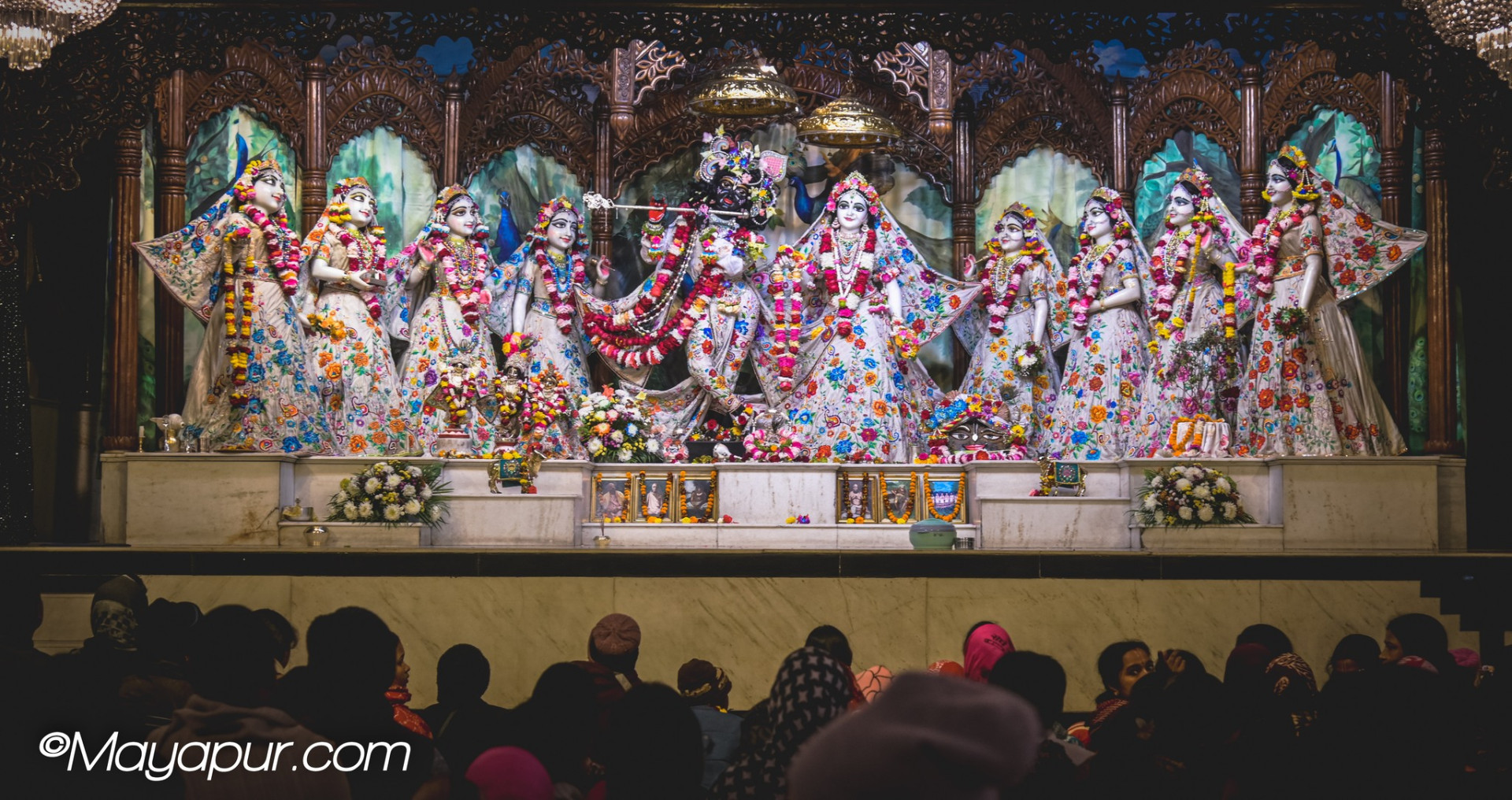


Finally, the first whisper of spring arrived, and on 23rd January, Vasanta Panchami was celebrated in its full grandeur at Sri Mayapur Dham.
Vasanta Panchami marks the first day of spring in India, the season of renewal, blossoming life, and gentle warmth after winter’s stillness. In Sri Mayapur Dham, this sacred day is not merely observed—it is offered, with devotion overflowing in color, fragrance, and loving service to Sri Sri Radha Madhava.
On this auspicious occasion, the altar transformed into a golden vision of spring. Bunches and bundles of fresh flowers were lovingly gathered and arranged, culminating in a breathtaking marigold petal dress that shimmered like the bright spring sun itself. The golden-yellow hues radiated warmth, joy, and divine celebration.
For an entire day prior, the students of the Mayapur Institute and the devotee community came together as one heart and one effort—bringing magic to life through seva. Every petal was placed with intention, every detail infused with love, creating not just a dress, but a living offering of devotion.
Srimati Radharani, along with Her Ashta-sakhis, were adorned in a beautiful yellow tint, embodying the spirit of Vasanta. Yellow—Vasanti Vastra—symbolizes the blooming mustard fields of Vraja, the returning warmth of the sun, and the joy of divine love awakening once more.
As Lord Krishna declares in the Bhagavad-gita (10.35):
“ṛtūnāṁ kusumākaraḥ” —
“Of seasons, I am the flower-bearing spring.”
And truly, standing before the Deities, one could feel that verse come alive.
The mukut (crowns) were exquisitely crafted—ornate, radiant, and regal—adorned with floral artistry that framed Their lotus faces perfectly. Each crown shimmered with intricate detailing, enhancing the already supremely beautiful expressions of Sri Sri Radha Madhava. Even Chota Radha Madhava appeared exceptionally enchanting, Their youthful forms glowing with a sweetness that captured every heart.
The inspiration for this divine attire was drawn from Prabhudhananda Saraswati’s Sri Vrindavan Mahatmya, where the glories of Srimati Radharani are described so poetically. It is said that the black bumblebees are irresistibly drawn only to the lotus feet of Srimati Radharani, intoxicated by Her unmatched beauty and divine fragrance—just as every soul is naturally drawn to Her loving shelter.
On Vasanta Panchami, that truth felt visible.
The altar itself seemed to hum with life, like Vrindavan in spring—where devotion blooms effortlessly and love flows without restraint.
This was not just a festival.
It was spring offered at the lotus feet of the Divine Couple!
Along with the celebration of spring and the divine beauty of Sri Sri Radha Madhava, Vasanta Panchami is also made even more auspicious by the appearances and remembrances of exalted Vaishnava personalities, whose lives embody devotion, renunciation, and pure love for Krishna.
• Srimati Vishnupriya Devi (Appearance)
The eternally devoted consort of Lord Sri Chaitanya Mahaprabhu, Srimati Vishnupriya Devi is worshiped for Her unparalleled chastity, patience, and absorption in the Holy Name. After Mahaprabhu accepted sannyasa, She spent Her life in deep separation, offering every moment in chanting and remembrance—showing the world the highest standard of quiet, unwavering devotion.
• Srila Raghunatha Dasa Goswami (Appearance)
One of the Six Goswamis of Vrindavan and the prayojana-acharya of our Gaudiya lineage. His life exemplifies the pinnacle of renunciation and internal service. Through his writings and example, he revealed the deepest moods of service to Srimati Radharani, guiding devotees toward the ultimate goal of pure love of God.
• Srila Raghunandana Thakura (Appearance)
A perfect example of childlike faith and simplicity. As a young boy, his loving devotion compelled his Deity of Sri Gopinatha to actually eat the offerings he prepared—demonstrating that Krishna is conquered not by ritual, but by pure love.
• Srila Pundarika Vidyanidhi (Appearance)
A most confidential associate of Lord Chaitanya and the spiritual master of Gadadhara Pandita. Mahaprabhu would lovingly address him as “Father” and would weep in remembrance of his deep devotion and refined spiritual ecstasy.
• Srila Visvanatha Chakravarti Thakura (Disappearance)
One of the most profound acharyas in the Gaudiya Vaishnava tradition. He gifted the world timeless works such as Gurvastakam, which devotees sing daily, and illuminating commentaries on the Srimad-Bhagavatam. His writings protect and clarify the pure teachings of bhakti.
• Goddess Saraswati (Worship on Vasanta Panchami)
On this day, Saraswati Devi, the goddess of learning and wisdom, is worshiped. In the Vaishnava understanding, she is recognized as a devotee of Krishna who bestows transcendental knowledge, enabling the soul to understand and glorify the Supreme Lord properly.

The air in Sridham Mayapur is changing. We are entering that sacred window of the year where the spiritual energy intensifies, beginning with the fragrant Sri Radha Madhava Pusya Abhishek and leading us into a season of unparalleled devotion.
Among these pearls of festivities, one shines with a particular mercy: Sri Nityananda Trayodasi.
In just a few weeks, we will celebrate the appearance of Lord Nityananda Rama. He is none other than Lord Balarama Himself—the original Guru, the embodiment of service, and the reservoir of spiritual strength. Without the mercy of Nitai, one cannot approach Sri Caitanya Mahaprabhu or the groves of Vrindavan. He is the Adi-Guru, wandering the streets of Bengal with ankles bells jingling, begging everyone to chant the Holy Name.
Nityananda Avadhutendu, Vasuda-prana-vallabha Jahnavi-jivita-pati, Krsna-prema-pradayaka
"Lord Nityananda is the Moon of all Avadhutas, the dear life-breath of Vasuda (His wife). He is the Lord of the life of Jahnavi Devi and the bestower of ecstatic love for Krishna."
A Celebration of Two Dhams
In Mayapur, this festival is a grand symphony of splendor and soul. It unfolds simultaneously in two holiest of places:
1. Sri Ekachakra Dham: The birthplace of Lord Nitai, where the atmosphere is flooded with ecstatic Kirtan as devotees welcome the Lord back to His home.
2. Sri Mayapur Dham: Where the festivities begin with a soul-stirring Adhivas Kirtan, leading into the grand Abhishek and feast.
This year, the nectar flows from January 28th through January 31st, 2026.
As the festival approaches, we invite you to be more than a witness—we invite you to be a participant in the Lord’s pleasure. Whether it is donation towards feeding the thousands of pilgrims who journey to the Dham, Abhisheka sevas or pooja offerings. Every seva performed for Nitai returns a thousand-fold in spiritual bliss.
How to Contribute
If you feel the call of Lord Nityananda in your heart, please seize this moment to serve according to your means.
Donate Online: https://www.mayapur.com/festivals/Nityananda-Trayodasi
For more information on specific sevas or to confirm your donation, please contact Shyamagopika Devi Dasi at +91 95934 00192
Or write to us donorservices@mayapur.com
Let us come together to flood the world with the mercy of Nitai. We look forward to welcoming you to Mayapur this festival season!
Your Servant,
Gopijanavallabha Das
Festival Committee Team

Puṣya Abhiṣeka is not merely a festival of flowers; it is a festival of love, born from the tender desire of the gopīs to lovingly care for and decorate their beloved Krishna. In Vṛndāvana, Krishna was never seen as the Supreme Lord alone—He was the darling of the gopīs, a playful child, a mischievous boy, lovingly handled, dressed, and adored by those whose hearts existed only for His pleasure.
It is said that Krishna was just like a toy in the hands of the gopīs. Overflowing with affection, they once decided, “Let us decorate Krishna beautifully—again and again—so that He may feel our love.” From this simple yet profound desire arose the pastime of Puṣya Abhiṣeka, where Krishna is decorated profusely with flowers, ornaments, and garments, followed by joyous celebration so that all may behold His beauty.
In Śrīdhāma Māyāpur, this festival has become one of the most majestic and heart-touching celebrations of the year—and fittingly, it is the very first grand festival that welcomes the new year. It sets the tone for the months to come: devotion first, beauty in service, and love at the center.
On this auspicious Pūrṇimā day, Their Lordships were entirely draped and garlanded in flower petals of every variety—not merely wearing flower dresses, but embodying a labor of pure love. Each petal was placed by devoted hands, each garland strung with care, patience, and prayer. The result was not just beauty, but devotion made visible.
The day began even before the sun rose, with kathā and Śrīmad Bhāgavatam class by His Holiness Jayapatākā Swami Mahārāja, who spoke on the profound pastime of Devahūti and Kardama Muni—touching upon marriage in devotional life, service in the dhāma, and the deeper purpose of relationships when centered around Krishna. These reflections prepared the hearts of devotees to enter the festival mood with depth and sincerity.
As the day unfolded, devotees were blessed to behold Their Lordships adorned in magnificent white flower dresses, intricately designed with countless delicate petals arranged with care and devotion. Each detail reflected the loving effort of the devotees, and in the midst of this radiant floral setting, Śrī Mādhava shone brilliantly like a black jewel, His beauty standing out strikingly against the pristine white flowers, leaving everyone deeply absorbed in the sweetness of the darśana.
Then, at 7:00 PM, the festival reached its crescendo. The temple resounded with melodious kīrtans as ārati was offered to the Divine Couple. In that moment, it felt as though time stood still. The atmosphere was saturated with devotion, music, fragrance, and joy—transporting everyone present into what felt like a glimpse of the spiritual world.
What makes Puṣya Abhiṣeka in Mayapur especially extraordinary is that not only Chota Rādhā Mādhava receive this flower bath, but the full-sized Deities—Śrī Rādhā Mādhava, Śrī Pañca-tattva, Śrī Prahlāda Nṛsiṁhadeva, and Śrīla Prabhupāda—are all bathed in flowers. And just as importantly, every devotee present is bathed in mercy.
The celebrations continue late into the night, with hearts overflowing, faces glowing, and spirits uplifted. One leaves not tired, but fulfilled—carrying the fragrance of flowers and devotion within.
As the festival gently concludes, it leaves behind something lasting: a mood for the entire year. Puṣya Abhiṣeka opens the door to a series of divine celebrations—Vasanta Pañcamī, Śrī Advaita Ācārya’s Appearance, Śrī Nityānanda Trayodaśī, and the grand Gaura Pūrṇimā festivities—all following one after another, like beads strung on the garland of devotion.
Until next year, Puṣya Abhiṣeka reminds us of a simple truth taught by the gopīs themselves:
Krishna is conquered not by opulence, but by love—and love is best expressed through heartfelt service.

Dear Beloved Devotee and Well-Wisher,
May Lord Śrī Krishna and Mother Ganga shower their blessings upon you.
Wishing you a blissful, auspicious, and prosperous New Year 2026.
At the divine confluence of the Bay of Bengal and Mother Ganga rests Gangasagar Dham—celebrated in the scriptures as a holy tīrtha that can wash away the accumulated sins of innumerable lifetimes.
During the annual Gangasagar Mela on the auspicious day of Makar Sankranti, millions of sādhus and tīrtha-yātris travel great distances—many walking for days, some sleeping beneath the open sky, others elderly, fragile, hungry, thirsty, or physically exhausted. Yet all of them come with one profound aspiration: purification of the heart, spiritual upliftment, and the hope of receiving the Lord’s mercy in this holy dhām.
Scriptures narrate how King Bhagirath brought Mother Ganga to earth and liberated his forefathers. Gangasagar, further sanctified by the intense tapasya of Lord Kapila Muni, is described in Vedic śāstra as a sacred place where bathing on Makar Sankranti bestows peace, prosperity, auspiciousness, and liberation from material suffering.
On this very day, the Sun enters Uttarāyaṇa—a supremely auspicious moment that even Bhīṣma Pitāmaha waited for before leaving his earthly body.
Across India, this festival is celebrated under many names—Poush Sankranti, Pongal, Lohri, Magh Bihu, Uttarayan, Khichdi, Pedda Panduga—yet everywhere its essence remains one: charity, compassion, purification, and devotion.
ISKCON Gangasagar Seva Camp
This year once again, ISKCON Gangasagar is setting up a devotional seva camp on the banks of Mother Ganga to lovingly serve thousands of pilgrims with:
Hot, nutritious prasādam
Shelter and resting facilities
Spiritual association
Medical care
Gītā-dāna and vastra-dāna
Drinking water and sanitation
Compassionate assistance
This divine mission can be accomplished only through the generous support of devotees and well-wishers like you.
The Glory of Bengal
The Vedic Center for Culture & Education
International Society for Krishna Consciousness
Founder-Ācārya: His Divine Grace A. C. Bhaktivedanta Swami Prabhupāda
Address:
Hare Krishna Land, Road No. 5, Near Helipad
Village, PO & PS: Gangasagar Coastal
24 Parganas (South), West Bengal – 743373
Contact:
iskcongs@gmail.com
97353 33511 / 98744 37164
www.iskcongangasagar.com
About the Pilgrims
During the Mela, pilgrims arrive weary—often elderly or ill, many having walked barefoot for miles. They seek:
Hari-kathā
Harinām-saṅkīrtan
Blessings and guidance
Prasādam and drinking water
Medical assistance
A moment of spiritual refuge
Your support offers nourishment, relief, dignity, and upliftment to thousands.
The scriptures declare:
“Tīrtha-kurvanti tīrthāni sādhavaḥ”
It is the saintly devotees who sanctify the holy places.
Serving pilgrims is therefore serving the Lord Himself. As Krishna assures in the Bhagavad Gītā (9.26):
“Patram puṣpam phalam toyaṁ…”—even a leaf offered with devotion is lovingly accepted by Him.
Seva Requirements for Gangasagar Mela 2026
To organize the ISKCON Gangasagar Mela 2026 Seva Camp, we humbly require ₹50 lakhs, covering:
Prasādam distribution
Accommodation and kitchen setup
Sanitation and drinking water
Vastra-dāna & Gītā-dāna
Medical assistance
Volunteer services
Prasādam Seva Goal
1,50,000 pilgrims
₹30 per prasādam plate
(Rice, dal, sabji, pickle/halwa)
Served from early morning till midnight
Special Donor Facilities (First Time Ever)
Sponsor 7,000 meals (₹2,10,000 and above):
AC Super Deluxe Guest House accommodation
Donor banner display
Opportunity to personally serve pilgrims
Sponsor 1,000 meals (₹30,000):
VIP Tent accommodation (common toilets)
Donor banner display
All donors receive:
Personalized appreciation letter
Sealed bottle of Holy Ganga water
Sanctified prasādam packet
A Humble Appeal
Imagine an elderly pilgrim who has walked for two days…
A mother shielding her child from icy winds…
A sadhu relying entirely on the Lord’s mercy…
When such pilgrims receive warm prasādam, shelter, water, or even a gentle smile—that moment becomes your seva. The Lord sees it, and Mother Ganga lovingly witnesses it.
With Gratitude
On behalf of ISKCON Gangasagar, we sincerely thank you for your trust and support. With folded hands, we invite you to join this sacred mission of compassion and devotion.
Please support according to your capacity.
For assistance:
Shri Sundar Govind Das – 97353 33511 / 98744 37164
iskcongs@gmail.com
May Lord Kapila Muni and Mother Ganga bless you and your family with devotion, protection, prosperity, and spiritual happiness in the New Year.
Your insignificant and ever-grateful sevak,
Shri Sundar Govind Das
Temple President
ISKCON Gangasagar International
Tax Benefit
All donations toward annadāna are eligible for 80G tax exemption (India).
http://www.iskcongangasagar.com/gs-mela-2026.html

